Introducción: El secreto detrás de cada cono de helado crujiente
Cada delicioso cono de helado comienza con algo más que harina y azúcar: comienza con una receta cuidadosamente equilibrada.. Ya sea que esté produciendo conos para su heladería o tenga una línea de fabricación de conos industriales., entendiendo el Ingredientes utilizados para hacer conos de helado. Es esencial para lograr una textura perfecta., color, y crujiente.
como profesional Fabricante de máquinas de cono de helado, DT Food Machine Co., Limitado. sabe que la selección de ingredientes afecta directamente el rendimiento del horneado, calidad del cono, y eficiencia de producción. En este artículo, Exploraremos los ingredientes comunes utilizados en diferentes tipos de conos., cómo interactúan durante la cocción, y cómo optimizar su receta para la producción mecánica.
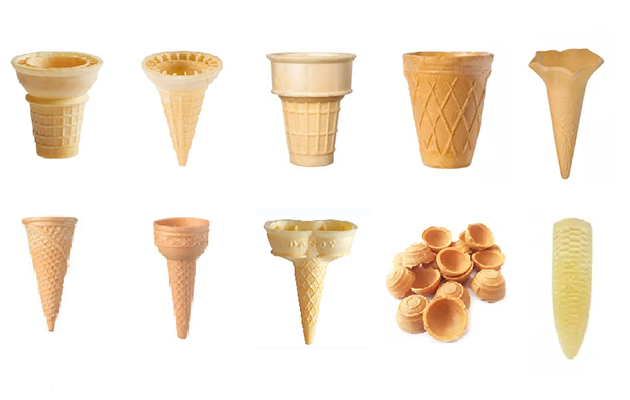
1. Ingredientes básicos para hacer conos de helado
Los conos de helado son esencialmente delgados., obleas crujientes hechas con una masa similar a la masa para panqueques o gofres. Los ingredientes básicos incluyen:
| Ingrediente | Función en la receta | Porcentaje típico (por peso) |
|---|---|---|
| Harina de trigo | Proporciona estructura y textura crujiente. | 40–45% |
| Azúcar | Añade dulzura y color dorado. | 20–25% |
| agua o leche | Proporciona humedad para formar masa. | 20–25% |
| Aceite vegetal o mantequilla | Agrega riqueza y una sensación suave en la boca. | 5–10% |
| Huevos o huevo en polvo | Mejora la elasticidad y el color. | 2–5% |
| Sal | Mejora el sabor | 0.5–1% |
| vainilla o saborizante | Agrega aroma | Cantidad de traza |
Estos ingredientes se mezclan para formar una masa suave que puede fluir fácilmente en los moldes para hornear del máquina de cono de helado.
2. El papel de cada ingrediente en la calidad del cono
2.1 Harina de trigo
La harina es la columna vertebral de la estructura del cono.. Contiene proteínas formadoras de gluten que crean una matriz estable cuando se hornea.. La harina adecuada garantiza que los conos mantengan su forma incluso cuando estén llenos de helado..
Consejo: Utilice harina media en proteínas. (8–10%) para un equilibrio ideal entre frescura y fuerza.
2.2 Azúcar
El azúcar se carameliza durante el horneado., dándole al cono su característico color marrón dorado y sabor dulce. También ayuda a conseguir un delicado crujido..
demasiada azúcar puede hacer que los conos se doren demasiado rápido o se vuelvan pegajosos después de enfriarse, mientras muy poco resulta en palidez, conos suaves.
2.3 Líquidos (Agua o Leche)
El agua controla la consistencia de la masa.. La leche agrega sabor adicional y un sabor más rico., pero demasiada grasa láctea puede provocar un horneado desigual en máquinas automáticas..
Para la producción industrial, Se prefiere la masa a base de agua para una viscosidad constante y una limpieza más fácil..
2.4 Grasas (Aceite vegetal o mantequilla)
Las grasas cubren las partículas de harina., reducir el desarrollo del gluten y hacer que los conos queden crujientes en lugar de masticables. También mejoran el sabor..
Los aceites vegetales como el aceite de palma o de girasol se utilizan comúnmente en la producción a gran escala por su estabilidad y rentabilidad..
2.5 Huevos o huevo en polvo
Los huevos aportan proteínas y color.. En entornos comerciales, huevo en polvo Se utiliza a menudo para facilitar el almacenamiento y la mezcla.. Mejora la elasticidad del cono., prevenir grietas durante el laminado.
2.6 Sal
Una pequeña pizca de sal realza el dulzor y mejora el equilibrio general del sabor..
2.7 Condimento
El extracto de vainilla o los saborizantes naturales pueden hacer que los conos huelan y sepan más atractivos.. Para uso industrial, Los polvos de sabor concentrado son ideales..
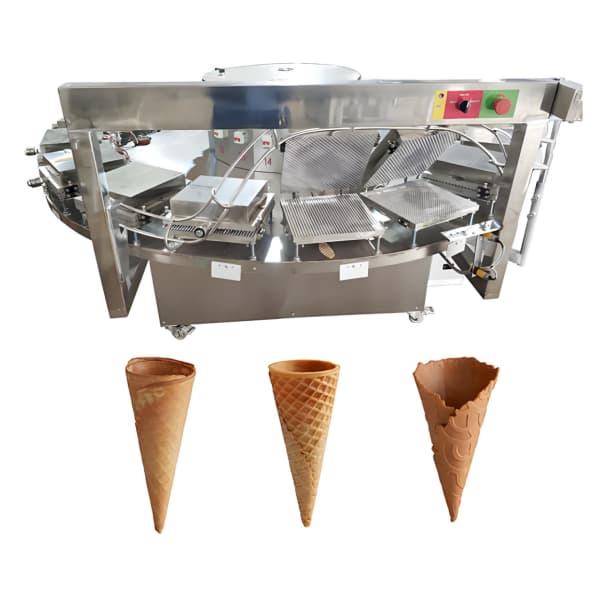
3. Tipos de conos de helado y sus diferencias en ingredientes
Diferentes conos requieren formulaciones ligeramente diferentes. A continuación se muestran los tipos más comunes.:
3.1 Conos de azúcar
Los conos de azúcar son dulces, crujiente, y dorado. Están hechos con más azúcar y menos grasa., dando como resultado una textura ágil.
Ingredientes típicos:
- Harina de trigo
- Azúcar
- Aceite vegetal
- Agua
- Sal
- Vainilla
Los conos de azúcar requieren temperaturas de horneado más altas (180–200°C) y sincronización precisa para evitar que se dore demasiado.
3.2 Conos de gofres
Los conos de gofre son más ligeros y aireados., con una textura delicada y rico sabor a mantequilla. Contienen más grasa y, a veces, leche para realzar el aroma..
Ingredientes típicos:
- Harina de trigo
- Azúcar
- Mantequilla o margarina
- Huevos
- Leche
- Vainilla
Por su alto contenido en grasas, los conos de waffle se hornean más uniformemente máquinas de conos de helado totalmente automáticas con control digital de temperatura.
3.3 Conos de oblea
Los conos de oblea son de color más claro y menos dulces.. A menudo se producen en masa utilizando máquinas industriales de cono tipo túnel.
Ingredientes típicos:
- Harina de trigo
- Azúcar
- Aceite vegetal
- agente leudante (opcional)
- Sal
- Agua
Estos conos son rentables y adecuados para envases de helados comerciales..
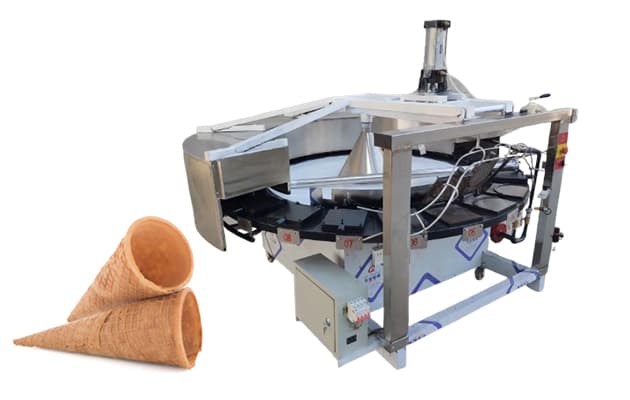
3.4 Conos bañados en chocolate
El cono base puede ser de azúcar o de gofre., pero se agrega una fina capa de cobertura de chocolate después de hornear y enfriar.. El revestimiento actúa como barrera contra la humedad., manteniendo el cono crujiente.
3.5 Conos personalizados y especiales
Los fabricantes ahora experimentan con ingredientes como:
- Harina de trigo integral por una opción más saludable
- Cacao en polvo para conos de chocolate
- polvo de matcha para sabor a té verde
- Harina de maíz o harina de arroz para conos sin gluten
4. Proporciones de ingredientes y su impacto en la producción de conos
Cada ingrediente afecta el comportamiento de horneado del cono y su textura final.. A continuación se muestran algunos efectos comunes observados durante la producción industrial.:
| Ajuste | Efecto sobre el cono |
|---|---|
| mas azucar | color más oscuro, cono crujiente, puede adherirse al moho |
| mas harina | Cono más grueso, menos crujiente |
| mas grasa | Sabor más rico, menos crujido |
| menos agua | masa demasiado espesa, horneado desigual |
| mas huevos | Flexibilidad mejorada pero color más oscuro. |
Mantener la proporción correcta Es esencial cuando se utiliza una máquina automática de conos de helado.. La masa demasiado espesa puede obstruir la bomba de llenado.; la masa demasiado fina puede desbordar los moldes.
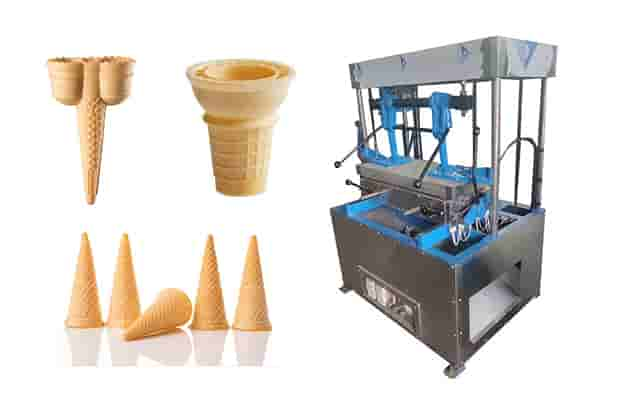
5. Cómo la calidad de los ingredientes afecta la eficiencia de la producción
Incluso usando la misma receta, La calidad de los ingredientes puede causar grandes variaciones en el rendimiento.:
- harina de baja calidad puede provocar la rotura del cono o una mala forma.
- Azúcar sin refinar puede crear color desigual.
- Exceso de impurezas del aceite puede provocar conos grasosos.
- Huevos viejos o polvo caducado puede afectar el olfato y el gusto.
Para líneas de producción industriales, DT Food Machine recomienda usando harina previamente tamizada, azúcar fina, y agua filtrada para garantizar un flujo de masa estable y limpio.
6. La ciencia de mezclar masa
La forma en que se mezclan los ingredientes determina la textura y estructura del cono..
6.1 Pasos de mezcla
- Mezclar ingredientes secos (harina, azúcar, sal).
- Agregue líquidos gradualmente (agua, aceite, huevos).
- Revuelva hasta que quede suave, formas de masa sin grumos.
- Deje reposar la masa durante 15 a 30 minutos antes de hornear..
6.2 Máquinas mezcladoras industriales
En grandes fábricas, a mezclador de masa continuo mantiene automáticamente la viscosidad y suministra la masa directamente a la máquina de conos. Esto asegura una textura consistente y evita el tiempo de inactividad..
6.3 Control de viscosidad de la masa
Viscosidad ideal: 20–30 segundos en una prueba de copa de flujo estándar.
Demasiado delgado → los conos se romperán fácilmente.
Demasiado espeso → mala extensión y color desigual.
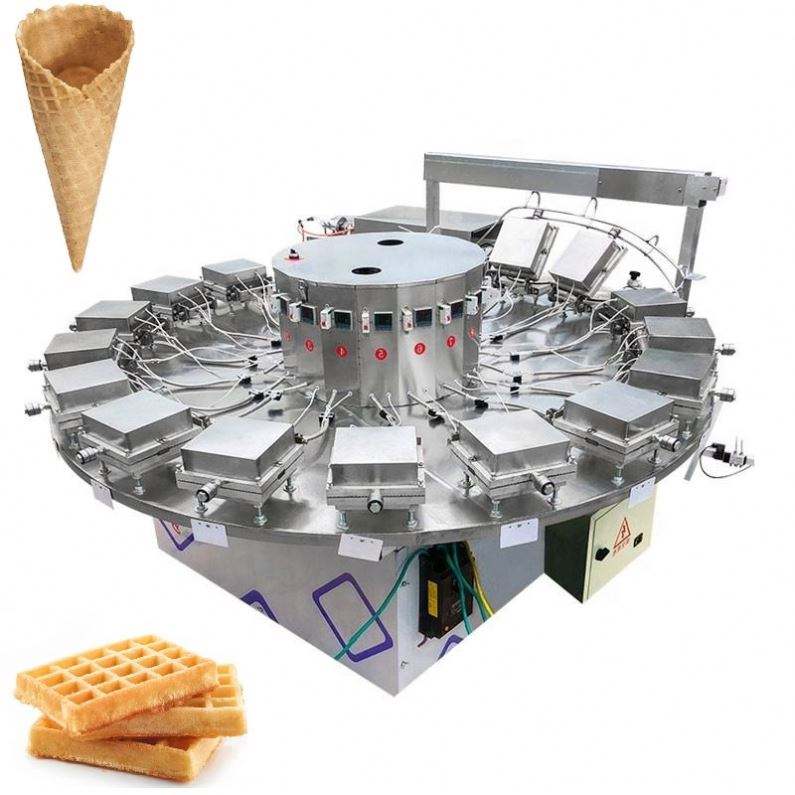
7. Hornear y formar: Cómo se transforman los ingredientes en la máquina
Dentro del máquina de cono de helado, El calor desencadena varios cambios químicos.:
- El agua se evapora, haciendo el cono crujiente.
- El azúcar se carameliza, dándole al cono un tono dorado.
- Las proteínas se coagulan, estableciendo la estructura del cono.
- La grasa se derrite, agregando un acabado suave.
El equilibrio adecuado de ingredientes garantiza que los conos se horneen de manera uniforme, Se libera fácilmente de los moldes., y mantener la frescura después de enfriar.
8. Adaptación de recetas para máquinas automáticas de conos
maquinas automaticas, como los hechos por Máquina de alimentos DT, requieren recetas optimizadas para el rendimiento industrial:
8.1 Uso de emulsionantes
Agregar emulsionantes como la lecitina garantiza una distribución uniforme de la grasa y el agua., evitando que se pegue.
8.2 Tamaño de partícula consistente
El azúcar fino y la harina mejoran la fluidez en las bombas de masa y reducen los residuos en los moldes.
8.3 Contenido reducido de huevo
Para evitar que se pegue y se acumule humo., Muchas fábricas utilizan huevos mínimos o en polvo..
8.4 Uniformidad de color
Si el color consistente es importante, algunos fabricantes utilizan color caramelo de calidad alimentaria o extracto de malta natural para estabilizar la sombra entre lotes.
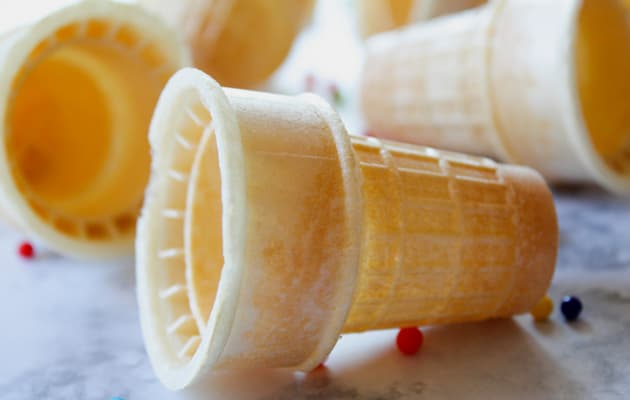
9. Problemas comunes y soluciones relacionadas con los ingredientes
| Problema | Causa probable | Solución |
|---|---|---|
| Los conos se rompen fácilmente | Muy poca grasa o huevos | Agrega más aceite o huevo en polvo. |
| color pálido | Azúcar insuficiente | Aumentar ligeramente el azúcar |
| Conos pegajosos | Demasiada azúcar o cocción insuficiente | Ajustar la receta y el tiempo de horneado. |
| La masa se separa | Mala mezcla o proporción incorrecta | Mezclar por más tiempo, comprobar la viscosidad |
| Palos de cono para moldear | Demasiada azúcar o moho sucio | Limpiar el molde, reducir el azúcar |
10. Ejemplo de receta industrial para la producción de conos de helado
Para 1,000 conos (aprox. 10 kg de masa):
| Ingrediente | Cantidad |
|---|---|
| Harina de trigo | 4.0 kilos |
| Azúcar | 2.2 kilos |
| Aceite vegetal | 0.8 kilos |
| Agua | 2.6 kilos |
| huevo en polvo | 0.2 kilos |
| Sal | 50 gramo |
| esencia de vainilla | 20 gramo |
Esta receta es ideal para máquinas de conos de helado totalmente automáticas utilizando sistemas de calefacción de gas o eléctricos.
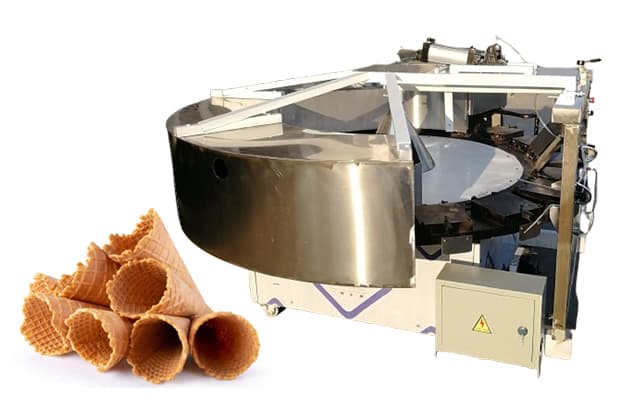
11. Cómo DT Food Machine apoya su producción de conos de helado
En DT Food Machine Co., Limitado., no solo suministramos máquinas de cono de alta calidad sino que también proporciona soporte técnico para:
- Desarrollo de recetas y ajuste de ingredientes.
- Diseño del sistema de mezcla de masa.
- Personalización del molde para hornear (forma, tamaño, patrón)
- Servicio postventa y formación.
Nuestras máquinas se exportan a más de 50 países y cuentan con la confianza de los fabricantes de conos de helado de todo el mundo.
12. Conclusión: Los ingredientes definen la calidad de los conos de helado
Entonces, ¿Qué ingredientes se utilizan para hacer conos de helado??
La respuesta es simple pero científica: una combinación de harina, azúcar, aceite, agua, y aromatizante que se convierte en una perfección crujiente bajo calor. El equilibrio exacto depende de su escala de producción y tipo de máquina..
Seleccionando los ingredientes correctos y manteniendo proporciones precisas, puede garantizar un rendimiento estable en su máquina de cono de helado, lograr una nitidez perfecta, y producir conos que deleitan a los clientes con cada bocado.
📩 Póngase en contacto con DT Food Machine hoy
Buscando iniciar o expandir su negocio de conos de helado?
DT Food Machine ofrece soluciones completas, desde el diseño de la máquina de conos hasta la guía de recetas.
